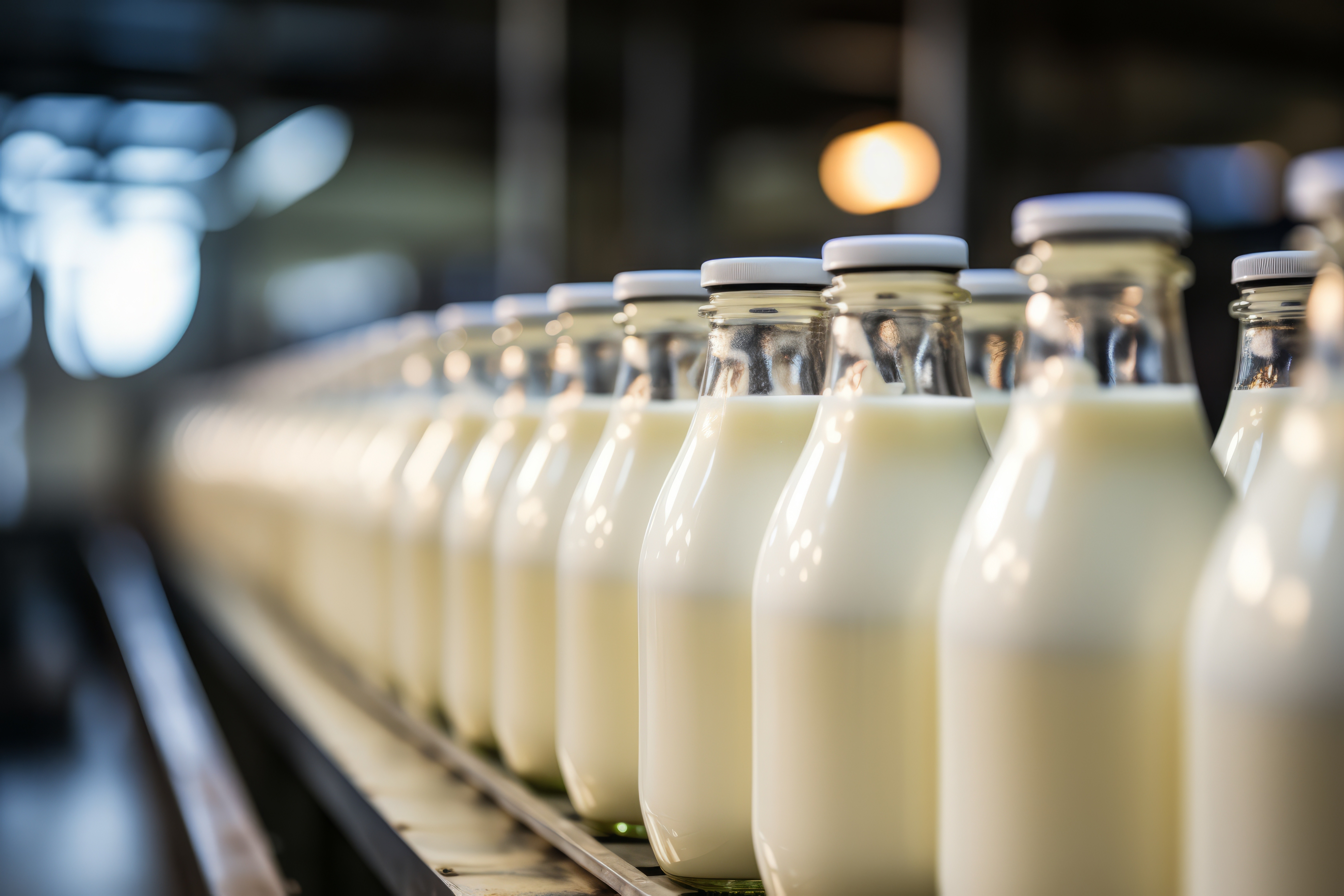AI's impact on Food & Beverage quality: Revolutionizing the industry

In previous blog posts, I’ve covered the challenges and opportunities in the manufacturing industry and why the process industry should care about AI in general. In this article, I focus on why quality in the Food & Beverage industry is paramount and how AI can be leveraged to mitigate challenges and optimize product quality.

Modern Food & Beverage factories utilize AI to optimize production processes and ensure consistent quality.
High-quality products not only ensure consumer safety and satisfaction but also bolster brand reputation and compliance with stringent regulatory standards. Pursuing exceptional quality is continuous, as even a single lapse can lead to significant financial losses, recalls, and irreparable damage to consumer trust. In this dynamic and highly competitive industry, leveraging advanced technologies like Artificial Intelligence (AI) is no longer a luxury but a necessity. AI, particularly through process optimization and predictive maintenance, is transforming how Food & Beverage companies manage and enhance product quality.
The importance of product quality
- Consumer safety and trust: Quality directly impacts consumer health in the Food & Beverage industry. Contaminants, spoilage, or incorrect ingredient proportions can lead to severe health issues. Consistent quality builds consumer trust and loyalty, which is crucial for sustained success.
- Regulatory compliance: The Food & Beverage sector is heavily regulated. Adhering to food safety standards like HACCP, FDA, and ISO is mandatory. High product quality ensures compliance with these regulations, avoiding hefty fines and sanctions.
- Brand reputation: Quality is synonymous with brand reputation. Companies known for high-quality products enjoy a competitive edge. Conversely, any quality failure can result in negative publicity and long-term brand damage.
- Economic impact: Poor quality leads to product recalls, wastage, and rework, significantly impacting profitability. Consistent quality management minimizes these risks, optimizing production costs and maximizing profit margins.
- Sustainability: High product quality contributes to sustainability by reducing waste. Efficient processes minimize the discard of raw materials and finished products, aligning with environmental goals and enhancing the company's sustainability profile.
Harnessing the power of data
Food & Beverage factories generate vast amounts of data from various sources, including production lines, quality control checks, and environmental sensors. However, this data is often underutilized, leading to missed opportunities for improving efficiency and product quality. AI and Machine Learning can transform this data into actionable insights:
- Data collection and integration: Modern Food & Beverage factories are equipped with numerous sensors and data collection systems that capture detailed information about every aspect of the production process. This data includes temperature, humidity, machine performance metrics, lab tests, and quality control results.
- Data analysis and utilization: Historically, much of this data has been stored without comprehensive analysis. AI can process and analyze historic and real-time data to uncover patterns and correlations that are not immediately apparent, leading to significant improvements in quality and efficiency.
- Training machine learning models: Machine learning models can be trained on historical production data to predict outcomes and optimize processes. For instance, they can learn the optimal conditions for producing high-quality products enabling adjustment of production parameters in real time to maintain these conditions.
- Predictive quality control: By analyzing data from previous production runs, AI can predict potential quality issues before they occur. This proactive approach allows operators to make adjustments before defects arise, ensuring consistent product quality.
- Continuous improvement: The insights gained from AI analysis can be used to refine and improve production processes continuously. This leads to a cycle of ongoing improvement, where each production run benefits from the learnings of previous runs.
Leveraging AI for process optimization
Process optimization in the Food & Beverage industry involves enhancing various stages of production to achieve better efficiency, reduce waste, and maintain consistent product quality. AI-driven process optimization can significantly improve these areas:
- Waste reduction: By analyzing production data, AI can identify patterns and anomalies causing poor product quality, leading to waste. This not only reduces costs but also aligns with sustainability goals, which are increasingly important to consumers.
- Real-time quality control: AI systems can monitor critical parameters such as temperature, pH levels, and moisture content in real-time. Any deviation from the optimal range is immediately detected, allowing for prompt corrective actions by operators to ensure quality standards are met.
- Continuous quality optimization: AI can enable closed-loop process optimization by streaming predictions from Machine Learning models back to control or automation systems. Implementing a closed-loop system ensures that production processes are continuously refined based on real-time data, leading to more consistent and higher-quality outputs.
Leveraging AI for predictive maintenance
Predictive maintenance involves using data-driven insights to predict equipment failures before they occur, ensuring uninterrupted production and maintaining product quality. Here's how AI enhances predictive maintenance:
- Anomaly detection: Machine learning models can analyze historical and real-time data from machinery to detect anomalies that indicate potential failures. Early detection allows for timely maintenance, preventing equipment breakdowns that could compromise product quality.
- Condition monitoring: AI systems can continuously monitor the condition of critical equipment such as mixers, pumps, filters, and pastures. Any signs of wear and tear are flagged, allowing for maintenance scheduling that minimizes downtime.
- Failure prediction: Advanced AI models can predict when a piece of equipment is likely to fail based on usage patterns and historical data. This proactive approach ensures maintenance is performed just in time, avoiding unexpected failures and production halts.

High-quality standards in the Food & Beverage industry ensure consumer trust and safety.
Challenges in implementing AI projects
Despite the clear benefits, many AI projects in the Food & Beverage industry fail to deliver tangible business value due to several reasons:
- Lack of skills: Implementing AI solutions requires specialized skills in data science, machine learning, and AI, which many Food and beverage companies lack and find difficult to attract. Quality engineers and operators who understand the specific challenges in the factory typically lack the technical expertise and coding skills to develop AI models.
- Complex and lengthy projects: AI projects can be complex and time-consuming, often requiring significant upfront investment in time and resources. The complexity can lead to extended project timelines, causing delays and potential disruptions to ongoing operations.
- Difficulty in operationalizing and scaling: Even when successful pilots are achieved, scaling these solutions across multiple production lines or factories can be challenging. Integrating AI solutions into existing systems and processes requires robust infrastructure and ongoing support.
Enabling success with the Intelecy No-code platform
The Intelecy no-code platform addresses these challenges by empowering quality engineers and operators with the tools they need to leverage AI without requiring extensive technical expertise or programming skills:
- User-friendly interface: Intelecy’s platform provides a user-friendly, no-code interface that allows engineers and operators to build and deploy AI models without writing a single line of code. This democratizes AI, making it accessible to those who best understand the factory's challenges.
- Empowering domain experts: Intelecy bridges the gap between domain expertise and technical capability by enabling quality engineers and operators to create AI solutions. These professionals can directly apply their deep knowledge of production processes to create tailored AI models that address specific challenges.
- Rapid prototyping and deployment: The solution enables rapid prototyping and deployment of AI models, significantly reducing project timelines. Quality engineers and R&D teams can quickly test and iterate on models, ensuring that solutions are effective and can be operationalized swiftly.
- Seamless integration: Intelecy’s software is designed to integrate securely and seamlessly with existing factory systems and data sources in real-time. This ensures that AI models can be operationalized and scaled across multiple production lines or factories with minimal disruption.
- Closed-loop production optimization: Intelecy can interface with control systems like Distributed Control Systems (DCSs) or Programmable Logic Controllers **(**PLCs) to automatically adjust process parameters based on the insights and predictions from the analytics algorithms. This creates a feedback loop where the system continuously monitors the process, analyzes the data, makes predictions, and adjusts the controls to maintain optimal performance.
- Ongoing support and training: Intelecy provides ongoing support and training to ensure that users are proficient in using the platform and can continuously improve their AI solutions. This support is crucial for maintaining and scaling AI initiatives long-term.
CONCLUSION
In the Food & Beverage industry, product quality is the cornerstone of success. AI provides powerful tools for enhancing process and quality optimization by leveraging the vast amounts of data modern factories generate to train machine learning models. However, the successful implementation of AI projects can be hindered by a lack of skills, complex and lengthy projects, and challenges in operationalizing and scaling solutions.
The Intelecy no-code platform addresses these challenges by empowering quality engineers and operators to leverage AI effectively. By providing a user-friendly interface, rapid prototyping and deployment capabilities, seamless integration, and ongoing support, Intelecy enables Food & Beverage companies to utilize their data to its full potential, achieve higher efficiency, reduce waste, and predict equipment failures. This ensures consistent product quality, builds consumer trust, ensures regulatory compliance, and enhances overall profitability.
Leveraging AI in the Food & Beverage industry is not just about staying competitive; it’s about setting new standards for quality and efficiency. As AI technology continues to evolve, platforms like Intelecy will play a crucial role in ensuring that high-quality, safe, and delicious products are the norm rather than the exception.
Explore how Food & Beverage organizations are leveraging Intelecy to achieve substantial business value, and a concrete use case on how one of our clients have created AI models to optimize product quality.
Please reach out if you’d like a tailored demo or have any questions. We’re here to help you kick-start and succeed in your AI initiatives!
PS. Ready to try out the Intelecy no-code AI solution? Sign up for a free trial today.




